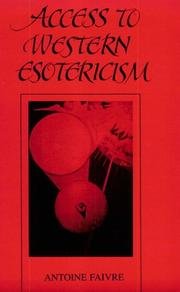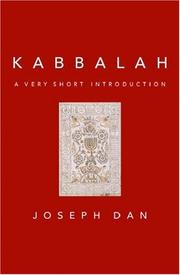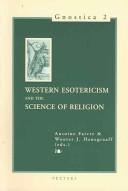| Listing 1 - 7 of 7 |
Sort by
|

ISBN: 0791421775 0791421783 Year: 1994 Publisher: New York State University of New York Press
Abstract | Keywords | Export | Availability | Bookmark
 Loading...
Loading...Choose an application
- Reference Manager
- EndNote
- RefWorks (Direct export to RefWorks)
Occultism --- History --- Esoteric sciences --- Western Esotericism --- the Alexandrian period --- Christian Kabbalah --- theosophy --- alchemy --- rosicrucianism --- Hermeticism --- universal interdependency --- spiritual transformation --- gnosis --- occultism --- androgyny --- Masonic symbolism

ISBN: 9780195300345 9780195327052 0195300343 Year: 2006 Publisher: New York, NY Oxford University Press, Inc.
Abstract | Keywords | Export | Availability | Bookmark
 Loading...
Loading...Choose an application
- Reference Manager
- EndNote
- RefWorks (Direct export to RefWorks)
Cabala --- 296*41 --- 296*41 Kabbala --- Kabbala --- Cabbala --- Jews --- Kábala --- Kabalah --- Kabbalah --- Qabalah --- Jewish literature --- Magic --- Mysticism --- Judaism --- Cabala. --- ancient Jewish mystisicm --- the Middle Ages --- the Medieval Kabbalah --- the Christian Kabbalah --- the Lurianic Kabbalah --- Hasidism --- the Sabbatian Messianic Movement
Book
ISBN: 1512824364 Year: 2023 Publisher: Jefferson, North Carolina : University of Pennsylvania Press,
Abstract | Keywords | Export | Availability | Bookmark
 Loading...
Loading...Choose an application
- Reference Manager
- EndNote
- RefWorks (Direct export to RefWorks)
The Hebrew word zimzum originally means "contraction," "withdrawal," "retreat," "limitation," and "concentration." In Kabbalah, zimzum is a term for God's self-limitation, done before creating the world to create the world. Jewish mystic Isaac Luria coined this term in Galilee in the sixteenth century, positing that the God who was "Ein-Sof," unlimited and omnipresent before creation, must concentrate himself in the zimzum and withdraw in order to make room for the creation of the world in God's own center. At the same time, God also limits his infinite omnipotence to allow the finite world to arise. Without the zimzum there is no creation, making zimzum one of the basic concepts of Judaism.The Lurianic doctrine of the zimzum has been considered an intellectual showpiece of the Kabbalah and of Jewish philosophy. The teaching of the zimzum has appeared in the Kabbalistic literature across Central and Eastern Europe, perhaps most famously in Hasidic literature up to the present day and in philosopher and historian Gershom Scholem's epoch-making research on Jewish mysticism. The Zimzum has fascinated Jewish and Christian theologians, philosophers, and writers like no other Kabbalistic teaching. This can be seen across the philosophy and cultural history of the twentieth century as it gained prominence among such diverse authors and artists as Franz Rosenzweig, Hans Jonas, Isaac Bashevis Singer, Harold Bloom, Barnett Newman, and Anselm Kiefer.This book follows the traces of the zimzum across the Jewish and Christian intellectual history of Europe and North America over more than four centuries, where Judaism and Christianity, theosophy and philosophy, divine and human, mysticism and literature, Kabbalah and the arts encounter, mix, and cross-fertilize the interpretations and appropriations of this doctrine of God's self-entanglement and limitation.
Cabala --- History. --- Christian Hebraists. --- Christian Kabbalah. --- Corey L. Twitchell. --- Creation. --- Hasidim. --- Hassidism. --- Isaac Luria. --- Jewish Mysticism. --- Kabbalah. --- Mysticism. --- Safed. --- Zimzum. --- cultural history. --- early modern. --- god omnipresence omnipotent. --- intellectual history of zimzum. --- liminal space. --- metaphysics. --- mysticism. --- self-limitation. --- sixteenth century. --- theology. --- translation.
Book
ISBN: 1479808008 Year: 2021 Publisher: New York : New York University Press,
Abstract | Keywords | Export | Availability | Bookmark
 Loading...
Loading...Choose an application
- Reference Manager
- EndNote
- RefWorks (Direct export to RefWorks)
"Kabbalah and the Founding of America explores the use of Jewish esoteric thought in colonial America by Quaker theologian George Keith, Puritan ministers Increase and Cotton Mather, the first Hebrew instructor at Harvard Judah Monis, and the seventh president of Yale Ezra Stiles, in shaping new Protestant American religious sensibilities"--
Protestantism --- History --- United States --- United States. --- États-Unis --- Civilization --- Jewish influences. --- Vie intellectuelle. --- Civilisation --- Influence juive. --- Intellectual life. --- Adam Cadmon. --- American Exceptionalism. --- American Identity. --- American Studies. --- Biblical Studies. --- Christian Kabbalah. --- Christian Quakerism. --- Colonial America. --- Congregationalism. --- Conversion. --- Cotton Mather. --- Daniel Leeds. --- Ezra Stiles. --- George Keith. --- Historiography. --- Increase Mather. --- Intellectual History. --- Jacob Boehme. --- Jewish Thought. --- Jewish-Christian Exchange. --- Jewish-Christian dialogue. --- John Adams. --- Judah Monis. --- Judeo-Christian. --- Kabbalistic hermeneutics. --- Lee Max Friedman. --- Messianism. --- Multi-culturalism. --- New Torah. --- Perry Miller. --- Protestantism. --- Puritanism. --- Quakerism. --- Religious polemics. --- Sabbateanism. --- Sefer Yetzirah. --- Shabbetai Tzevi. --- Shema’. --- Textual exegesis. --- Thomas Jefferson. --- Universalization. --- Zohar.

ISBN: 9042906308 9789042906303 Year: 1998 Volume: 2 Publisher: Leuven Peeters
Abstract | Keywords | Export | Availability | Bookmark
 Loading...
Loading...Choose an application
- Reference Manager
- EndNote
- RefWorks (Direct export to RefWorks)
Esoteric sciences --- Religious studies --- Colloques --- Colloquia --- Godsdiensten --- Parapsychologie --- Religions --- Occultism --- Occultisme --- Esotérisme --- Congresses. --- Religious aspects --- Congrès --- Aspect religieux --- 291 <063> --- 141.331 --- -Art, Black (Magic) --- Arts, Black (Magic) --- Black art (Magic) --- Black arts (Magic) --- Occult, The --- Occult sciences --- Supernatural --- New Age movement --- Parapsychology --- Godsdienstwetenschap: vergelijkend--Congressen --- Esoterische scholen:--vroege --- -Godsdienstwetenschap: vergelijkend--Congressen --- 141.331 Esoterische scholen:--vroege --- Esotérisme --- Congrès --- Art, Black (Magic) --- Congresses --- Occultism - Religious aspects --- Western Esotericism --- the science of religion --- the 17th Congress of the International Association for the History of Religions, Mexico City 1995 --- esoteric currents in Europe --- esoteric traditions --- the esoteric method --- religious symbolism --- medieval islamic alchemy --- medieval christian alchemy --- Christian Kabbalah --- Christian theosophic literature --- Masonic degrees --- Emanuel Swedenborg --- Illuminism --- French romantic philosophies --- Blavatsky --- Steiner --- Guénon --- Freemasonry
Book
ISBN: 1283114992 9786613114990 1400840007 9781400840007 9781283114998 9780691145082 0691145083 0691162158 9780691162157 Year: 2011 Publisher: Princeton, N.J. Oxford Princeton University Press
Abstract | Keywords | Export | Availability | Bookmark
 Loading...
Loading...Choose an application
- Reference Manager
- EndNote
- RefWorks (Direct export to RefWorks)
The Scandal of Kabbalah is the first book about the origins of a culture war that began in early modern Europe and continues to this day: the debate between kabbalists and their critics on the nature of Judaism and the meaning of religious tradition. From its medieval beginnings as an esoteric form of Jewish mysticism, Kabbalah spread throughout the early modern world and became a central feature of Jewish life. Scholars have long studied the revolutionary impact of Kabbalah, but, as Yaacob Dweck argues, they have misunderstood the character and timing of opposition to it. Drawing on a range of previously unexamined sources, this book tells the story of the first criticism of Kabbalah, Ari Nohem, written by Leon Modena in Venice in 1639. In this scathing indictment of Venetian Jews who had embraced Kabbalah as an authentic form of ancient esotericism, Modena proved the recent origins of Kabbalah and sought to convince his readers to return to the spiritualized rationalism of Maimonides. The Scandal of Kabbalah examines the hallmarks of Jewish modernity displayed by Modena's attack--a critical analysis of sacred texts, skepticism about religious truths, and self-consciousness about the past--and shows how these qualities and the later history of his polemic challenge conventional understandings of the relationship between Kabbalah and modernity. Dweck argues that Kabbalah was the subject of critical inquiry in the very period it came to dominate Jewish life rather than centuries later as most scholars have thought.Some images inside the book are unavailable due to digital copyright restrictions.
Cabala --- Cabbala --- Jews --- Kábala --- Kabalah --- Kabbala --- Kabbalah --- Qabalah --- Jewish literature --- Magic --- Mysticism --- History. --- Judaism --- Modena, Leone, --- Ari Nohem. --- Bible. --- Christian Kabbalah. --- Christianity. --- Cordovero. --- Elijah Benamozegh. --- Guide of the Perplexed. --- Hasidism. --- Hebrew printing. --- Isaac Haver Wildmann. --- Isaac Luria. --- Isaac Reggio. --- Israel Saruq. --- Jewish Kabbalah. --- Jewish community. --- Jewish intellectuals. --- Jewish law. --- Jewish life. --- Jewish modernity. --- Jewish theology. --- Jewish tradition. --- Julius Frst. --- Kabbalah. --- Leon Modena. --- Maimonides. --- Pardes Rimonim. --- Pico della Mirandola. --- Sabbatai Zevi. --- Sabbatianism. --- Safed Kabbalah. --- Solomon Rosenthal. --- Venetian Jews. --- Zohar. --- antiquity. --- contemporary Jewish life. --- divine being. --- early modern Venice. --- esoteric information. --- esoteric kabbalistic treatises. --- esoteric secrets. --- esotericism. --- exegesis. --- kabbalistic books. --- kabbalistic hermeneutics. --- kabbalistic theology. --- manuscript production. --- modernity. --- mystical symbolism. --- philosophic knowledge. --- philosophy. --- printed book. --- pseudepigraphic. --- ritual practices. --- sacred texts. --- sefirot. --- theosophical Kabbalah. --- theurgic powers.
Book
ISBN: 9780691203812 9780691240879 0691240876 Year: 2022 Publisher: Princeton, N.J. : Princeton Univ. P.,
Abstract | Keywords | Export | Availability | Bookmark
 Loading...
Loading...Choose an application
- Reference Manager
- EndNote
- RefWorks (Direct export to RefWorks)
The unlikely story of how Americans canonized Adam Smith as the patron saint of free marketsOriginally published in 1776, Adam Smith's The Wealth of Nations was lauded by America's founders as a landmark work of Enlightenment thinking about national wealth, statecraft, and moral virtue. Today, Smith is one of the most influential icons of economic thought in America. Glory Liu traces how generations of Americans have read, reinterpreted, and weaponized Smith's ideas, revealing how his popular image as a champion of American-style capitalism and free markets is a historical invention. Drawing on a trove of illuminating archival materials, Liu tells the story of how an unassuming Scottish philosopher captured the American imagination and played a leading role in shaping American economic and political ideas. She shows how Smith became known as the father of political economy in the nineteenth century and was firmly associated with free trade, and how, in the aftermath of the Great Depression, the Chicago School of Economics transformed him into the preeminent theorist of self-interest and the miracle of free markets. Liu explores how a new generation of political theorists and public intellectuals has sought to recover Smith's original intentions and restore his reputation as a moral philosopher. Charting the enduring fascination that this humble philosopher from Scotland has held for American readers over more than two centuries, Adam Smith's America shows how Smith continues to be a vehicle for articulating perennial moral and political anxieties about modern capitalism.
Philosophy. --- Economics --- Mental philosophy --- Humanities --- History. --- Smith, Adam, --- United States --- Economic policy --- Economic theory --- Political economy --- Social sciences --- Economic man --- Smith, Adam --- Economic policy. --- Economic conditions. --- A Monetary History of the United States. --- Ambivalence. --- American Capitalism. --- American Enlightenment. --- American System (economic plan). --- American Thinker. --- Anna Schwartz. --- Bruno Hildebrand. --- Buoy. --- Buton. --- Capitalism. --- Chicago school of economics. --- Christian Kabbalah. --- Constantine IV. --- Corippus. --- E. P. Thompson. --- Early modern period. --- Ecclesiastical Latin. --- Economics. --- Economist. --- Economy. --- Essay. --- Ethics. --- Family resemblance. --- Forgotten man. --- Francis Fukuyama. --- Frank Hahn. --- Fraud. --- Free trade. --- Friedrich List. --- Fritz Saxl. --- Gilded Age. --- Greek fire. --- Historical figure. --- Hypothesis. --- Ideology. --- International trade. --- Interpersonal relationship. --- Invisible hand. --- Isaac Casaubon. --- Jacob Viner. --- James Tassie. --- Jewish history. --- Jewish studies. --- John Bates Clark. --- John Maynard Keynes. --- Kanji. --- Labor theory of value. --- Laissez-faire. --- Lateran. --- Learning. --- Lecture. --- Liberty Fund. --- Lifestyle (sociology). --- Lighting. --- Lionel Robbins. --- Marquis de Condorcet. --- Mercantilism. --- Michael Burawoy. --- Michael Freeden. --- Michael Polanyi. --- Milton Friedman. --- Moral economy. --- Muslim world. --- Neoliberalism. --- Occupy movement. --- Opportunity cost. --- Persuasion. --- Physiocracy. --- Policy advocacy. --- Political economy. --- Politics. --- Progress and Poverty. --- Propaganda. --- Protectionism. --- Raymond Geuss. --- Re-Define. --- Retirement. --- Richard T. Ely. --- Robert Nozick. --- Roman Law. --- Ronald L. Meek. --- Scottish Enlightenment. --- Self-interest. --- Sexual desire. --- Social phenomenon. --- Suggestion. --- Tariff of 1824. --- Tariff. --- The Philosopher. --- The Price of Admission. --- The Road to Serfdom. --- The Theory of Moral Sentiments. --- The Wealth of Nations. --- Thomas Robert Malthus. --- Treatise. --- Utilitarianism. --- Wealth. --- Whiggism. --- Willibald.
| Listing 1 - 7 of 7 |
Sort by
|

 Search
Search Feedback
Feedback About
About Help
Help News
News